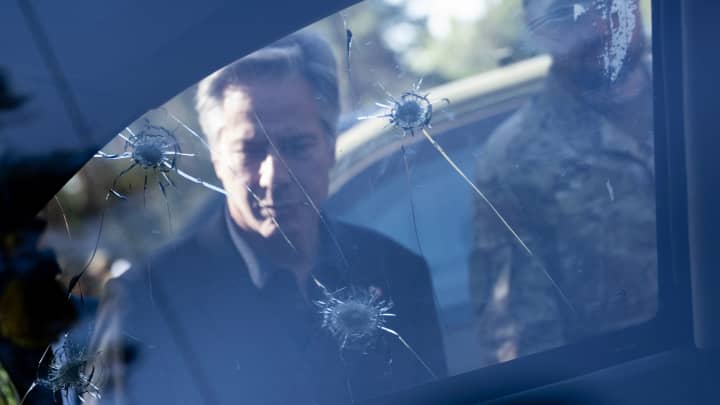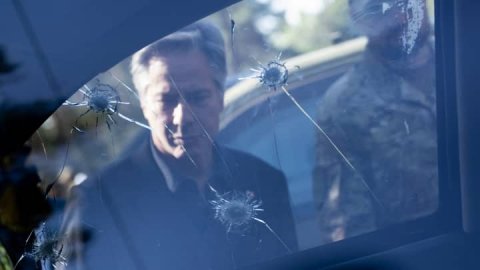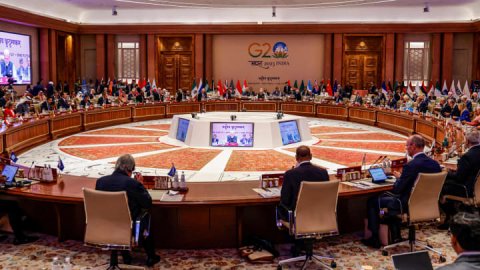
YAHIDNE, Ukraine — is making "very tangible progress" in its against , Secretary of State Antony Blinken told NBC News on Thursday.
Speaking on a , he acknowledged the challenge of keeping public attention on the conflict while rejecting concerns that American backing for Kyiv may be waning. He also placed the blame for a lack of peace talks at the door of the Kremlin.
The military campaign in Ukraine's south and east is seen as key to shoring up allied support for the country's cause, and after a slow start there have been positive signs.
Ukrainians "knew this was going to be a hard fight but especially over the last couple of weeks, we are seeing very tangible progress," Blinken said in an interview.
More from NBC News:
He said that he had heard a very detailed report from Ukrainian President , who recently visited the front lines, and his military advisers.
"I think we are seeing real forward movement," Blinken added. "But again, this is going to go on. This is tough, this is hard."
He was speaking during a visit to the town of Yahidne in northern Ukraine, where he toured a former elementary school in which some 300 people, including children, were held for a month by Russian forces shortly after last year's invasion. The site has since been turned into a museum.
"The Russians had a lot of time in this case to prepare for the counteroffensive. They put tens of thousands of mines in places, other defensive fortifications," he said. "The Ukrainians are working and going through it, but at the end of the day, they have a determination, they have a desire that will outmatch whatever the Russians put into this."
Blinken, the first senior U.S. official to visit since the Ukrainian counteroffensive began three months ago, flew into Kyiv on Wednesday where he met with Zelenskyy and other senior members of his government.
The first day of his visit was marred by a on a market in the eastern city of Kostiantynivka. Ukrainian officials said 17 people, including a child, were killed and 38 injured in the strike.
"These were people who were simply going shopping, trying to put food on the table," Blinken said. "So it's so important not to lose sight of what this means to the men and women of Ukraine."
Kostiantynivka is close to the front lines in the east, where Ukrainian forces have been battling to seize back occupied land before winter sets in.
Blinken announced a new package of U.S. wartime assistance worth more than $1 billion late Wednesday.
This included money for munitions, military financing and humanitarian assistance, as well as tackling corruption, the State Department said. More than $200 million was allocated to anti-corruption reforms and strengthening the justice sector.
The aid package is drawn from funding approved by Congress.
"Beyond even the equipment, beyond even the training, beyond even the resources that we're giving them, fundamentally what they're fighting for is what will make the difference," Blinken said.
Ukraine had no choice but to fight on because Russian President Vladimir Putin "shows no evidence that he is interested in meaningful diplomacy," he added.
Putin was "wrong" if he thought that "somehow he can outlast Ukraine, outlast us, outlast the dozens of countries that are supporting Ukraine," Blinken said.
Asked about North Korean leader Kim Jong Un's potential upcoming trip to Russia for arms talks with Putin, Blinken said this was a sign of the Kremlin's "desperation."
Russia has already largely dismissed the Ukrainian counteroffensive as a failure, and the slow nature of any progress since it was has led to growing criticism from some of Kyiv's closest partners about the way it is managing the war and fueled doubts about its ability to win a decisive military victory.
That in turn has led to sharp pushback from some Ukrainian officials, and Foreign Minister Dmytro Kuleba told critics to "shut up" in a briefing to reporters last week.
Despite staunch U.S. support for Ukraine since Russia's invasion in February last year, several Republican presidential hopefuls, including former President Donald Trump, have questioned the aid, fueling concerns over whether Washington will still back Kyiv at the same level once the 2024 election campaign intensifies.
The U.S. government has so far provided more than $43 billion in weaponry and other military aid to Ukraine and last month asked Congress to approve about $40 billion in additional spending, including $24 billion for Ukraine and other international needs.
— Richard Engel reported from Ukraine, and Gabe Joselow and Henry Austin from London.



